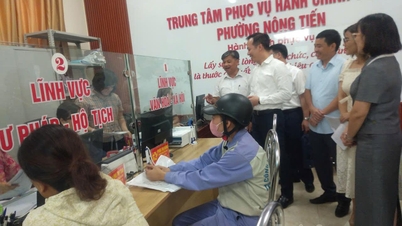Vietnam is one of the first countries in the world to issue a program or strategy on National Digital Transformation. To adapt to the new situation and take advantage of the opportunities brought by the fourth industrial revolution, on September 27, 2019, the Central Executive Committee issued Resolution No. 52-NQ/TW on a number of guidelines and policies to proactively participate in the fourth industrial revolution, emphasizing the urgent need to accelerate the digital transformation process.
On that basis, on June 3, 2020, the Prime Minister signed Decision No. 749/QD-TTg approving the national digital transformation program to 2025, with a vision to 2030.
Accordingly, Vietnam will become a digital, stable and prosperous country, pioneering in testing new technologies and models; fundamentally and comprehensively innovating the management and operation activities of the Government , production and business activities of enterprises, the way people live and work, and developing a safe, humane and widespread digital environment.

Vietnam is one of the first countries in the world to issue a program or strategy on National Digital Transformation.
The National Digital Transformation Program aims at the dual goal of developing digital government, digital economy, digital society, and forming Vietnamese digital technology enterprises with the capacity to go global, with some basic indicators.
Speaking at the recent Digital Transformation Day (October 10), Prime Minister Pham Minh Chinh emphasized that to effectively and substantially carry out national digital transformation, it requires a methodical strategy, focused implementation, and key points, creating changes in management, operation, and social governance methods.
The Government's consistent viewpoint is to take people and businesses as the center, the subject, the goal, the driving force and the resource of digital transformation. Digital transformation must allow people and businesses to benefit from public services and social utilities more conveniently, faster, more effectively, and they themselves will create resources for development.
The Head of Government presented four viewpoints on digital transformation. Among them, there must be a strategic vision and innovation in thinking, perception, and action to suit practical conditions; inherit and further promote the results achieved in the past; overcome barriers, difficulties, and challenges, create further breakthroughs with a national, comprehensive, and holistic viewpoint, leaving no one behind.
Strongly apply science and technology, promote innovation, create motivation in the spirit of catching up, progressing together and making breakthrough efforts in building digital government, digital economy and digital society.
National digital transformation must be implemented in a comprehensive and holistic manner, but quality must be prioritized over quantity. Priority must be given to developing digital data, online public services, developing digital platforms, ensuring network security and information security.
According to the Prime Minister, the national database is a new resource and an important foundation for national digital transformation, so it must have high connectivity, interconnectivity, and sharing among ministries, branches, localities, between levels of government, and between the public and private sectors; promote decentralization, delegation of authority, individualization of responsibilities associated with appropriate resource allocation, improve the capacity of implementing officials, strengthen inspection and supervision, and promote the responsibility of leaders.
In particular, it is necessary to promote proactiveness and creativity; mobilize all resources and participation of the entire political system, people and business community; harmonize interests among the State, people and businesses; so that people and businesses understand, support and actively participate in digital transformation.
Minister of Information and Communications Nguyen Manh Hung also emphasized that at the national level, digital transformation is the transformation of the national digital government, digital economy and digital society.
At the local level, digital transformation is the transformation to digital government, digital economy and digital society in that locality. Successful local digital transformation will contribute to the overall success of national digital transformation. Therefore, digital transformation is a task that requires the determination of the entire political system, and is implemented consistently and synchronously from the central to local levels.
Digital transformation is also a revolution for all people. Digital transformation is only truly successful when every citizen actively participates and enjoys the benefits that digital transformation brings.
Digital transformation carries with it a great mission, which is to popularize and personalize services (such as education services, health services, etc.) to each citizen to better serve them. Digital transformation creates opportunities for people in remote, border, and island areas to access online services in a fair, equal, and humane manner, "leaving no one behind".
For the digital transformation process to be successful, Minister Nguyen Manh Hung also emphasized that the first factor for success is people, specifically, it is necessary to increase awareness and responsibility of the organization's leaders.
“ If a leader does not want to change the way he works, there will be no digital transformation. If a leader wants to change the way he works but delegates the authority to his deputies to do digital transformation, there will also be no digital transformation ,” the Minister emphasized.
According to the Minister, digital transformation with three pillars of digital government, digital economy, and digital society has an impact on all agencies, units, and localities. Therefore, people and businesses must be the center, the subject, the goal, and the driving force of digital transformation. People and businesses must also participate in the digital transformation process.
It is necessary to have breakthrough thinking with strategic vision, have appropriate solutions and methods, but must stick to reality to build programs and plans with focus and key points. The thinking must be clear, determination must be high, efforts must be great, actions must be decisive, each work must be done with certainty, each work must be completed thoroughly.

Digital transformation must start with cognitive transformation (digital cognition).
Mr. An Ngoc Thao, Deputy General Secretary of the Vietnam Software and IT Services Association (VINASA), said that to successfully transform digitally, it is necessary to combine all resources, including the story of national digital infrastructure. First, Vietnam's legal infrastructure to promote digital transformation is rapidly improving.
From the Government to ministries and branches such as the Ministry of Information and Communications, Planning and Investment, Health, Education and Training... all make efforts to create legal corridors for agencies and units under their management to transform digitally. The legal corridor is gradually becoming clearer and in the coming time will be a lever to promote digital transformation.
Next, Vietnam's connection infrastructure is considered one of the leading countries in the region and in the world. Vietnam has more than 1 million km of fiber optic cable, 4G coverage of 98-99% and 5G is being commercialized. The quality of Vietnam's internet service is both cheap and good, which is a fact.
Next, the Government has focused on investing in data infrastructure in recent times. In addition to the 6 national databases that the Government has prioritized for deployment in areas such as population, land, business registration, population, finance and social insurance, other industry, local and organizational databases are being systematized by units and will be integrated into national data in the future.
Once Big Data is synthesized and converted into open-data for units to access and exploit, the data will play a huge role in promoting the digital transformation process, towards building a digital government.
In addition, currently, more than 40 data centers are being focused on building by large Vietnamese IT corporations and enterprises (such as Viettel, VNPT, FPT) in the direction of super data centers, contributing to solving Vietnam's big data problem.
Yen Hien
Source







![[Photo] National Assembly Chairman Tran Thanh Man attends the inauguration ceremony of the Memorial Site of National Assembly Standing Committee Chairman Bui Bang Doan](https://vphoto.vietnam.vn/thumb/1200x675/vietnam/resource/IMAGE/2025/9/28/6feba23492d14b03b05445dd9f1dba88)





























































































Comment (0)